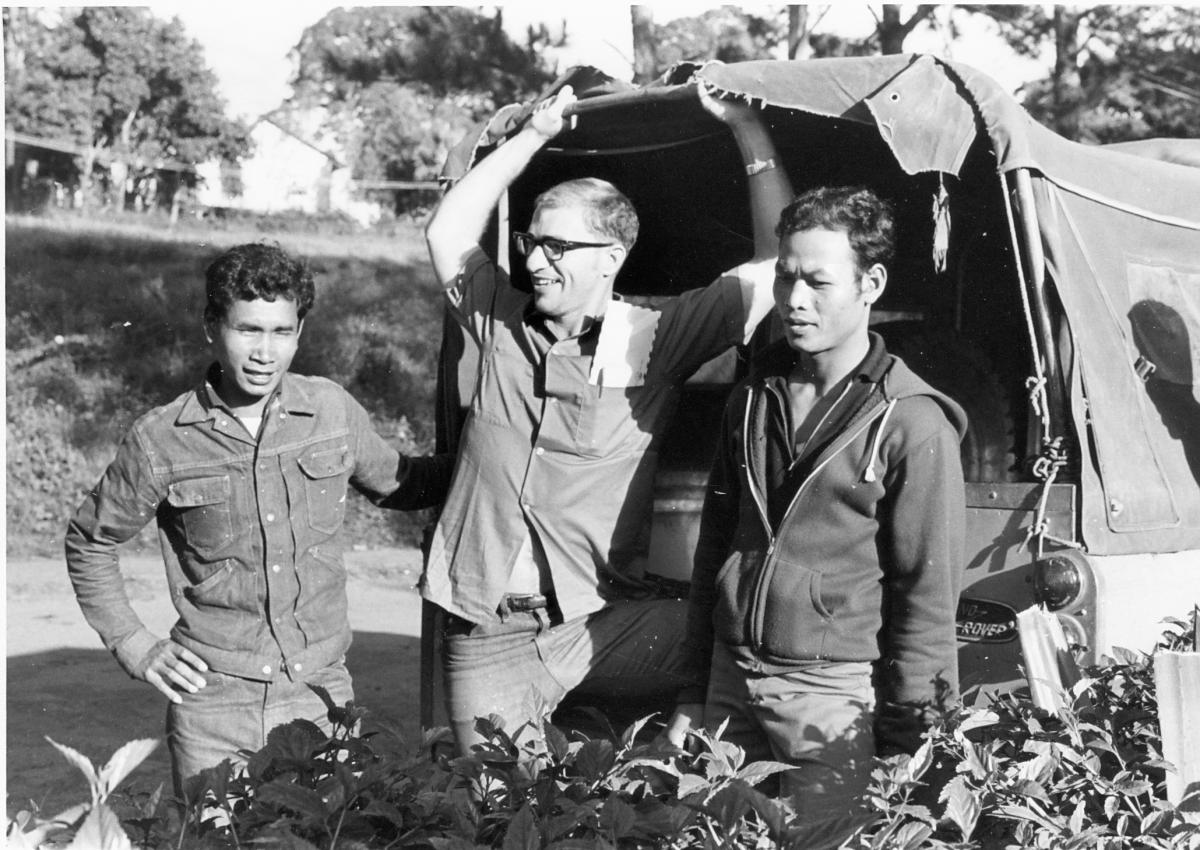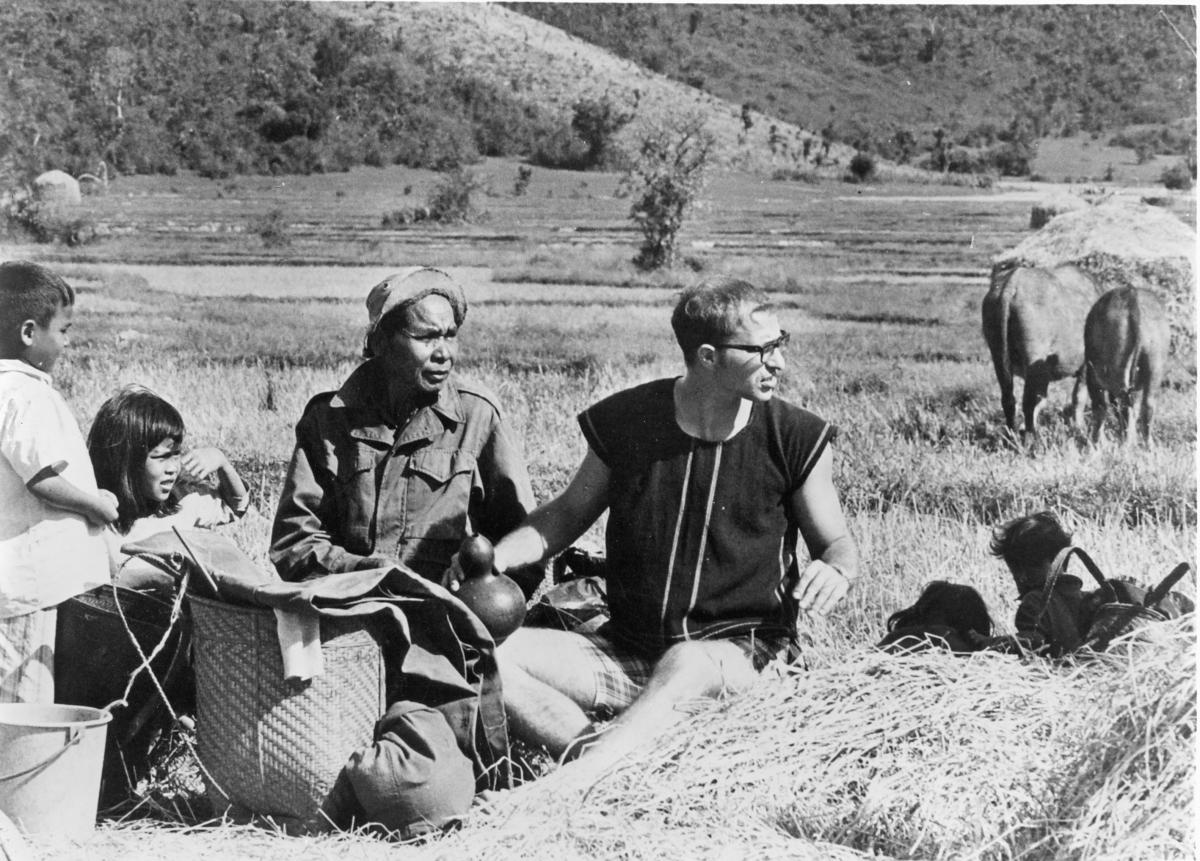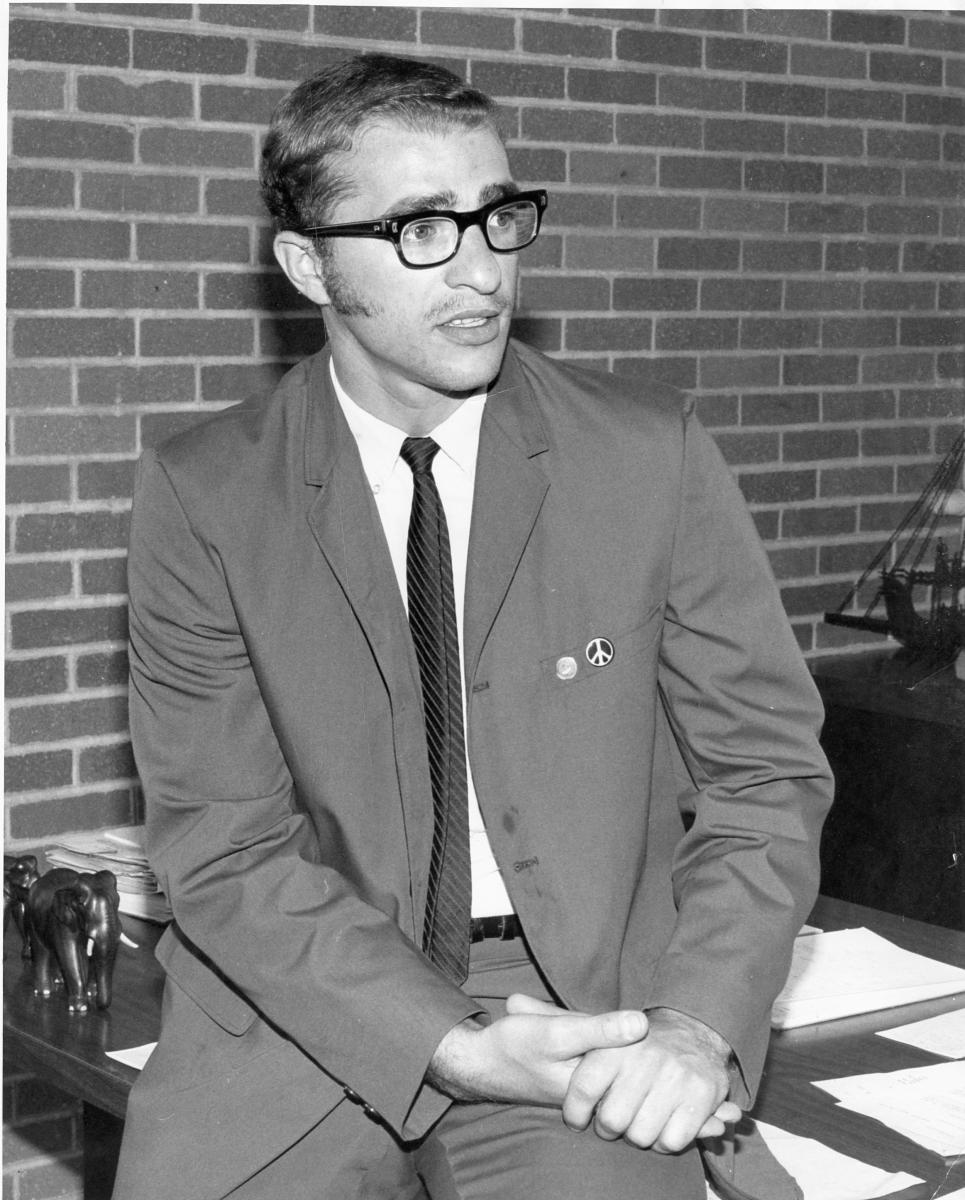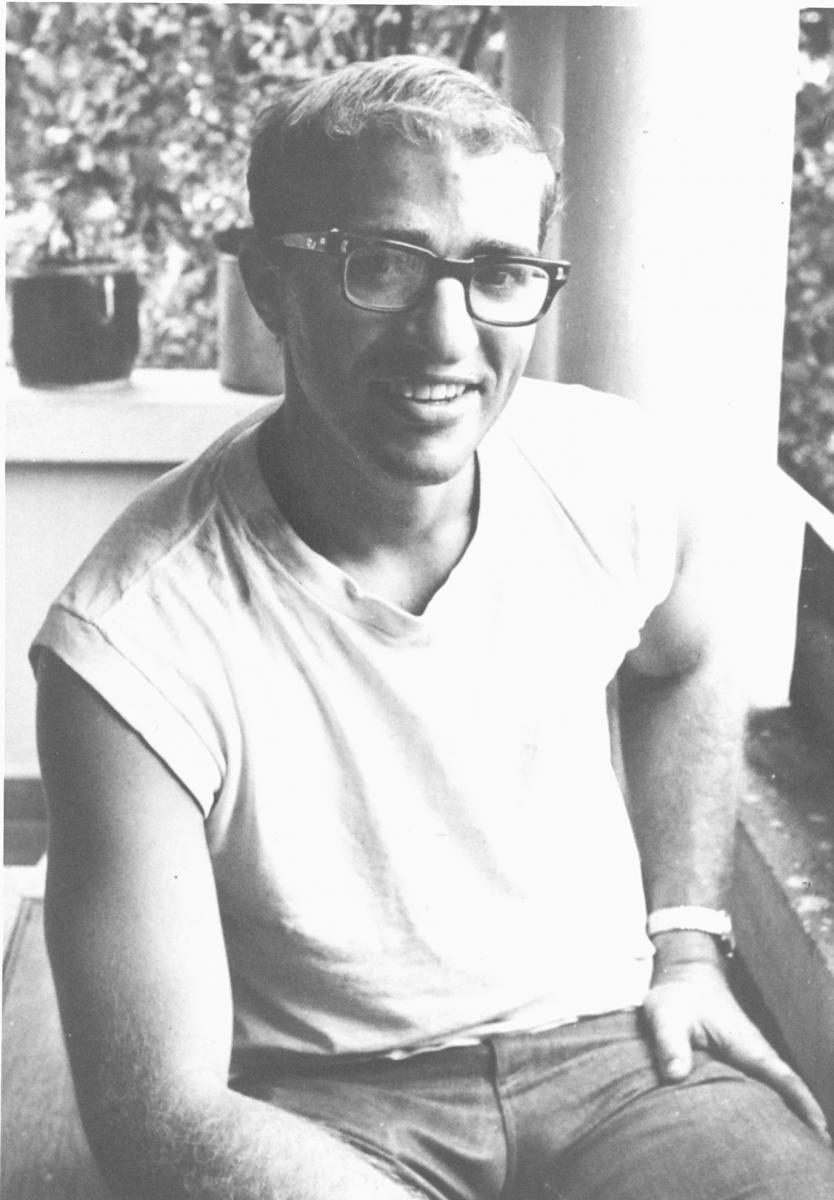Ted Studebaker

Ted Studebaker (center) with friends K'rah Kanning (right) and K'lai (left) Photo Credit: Brethren Historical Library and Archives
Howard Royer and Ted Studebaker (description of work in Di Linh)
Ted Studebaker (commitment to peace)
Ted Studebaker: A DISSENTER FROM DESPAIR
Messenger Magazine June 15, 1971
"Cool it and don't fret; this boy knows what he's doing."
These were among the parting salvos of Ted Studebaker as he left his Ohio homeland in the spring of 1969 for Brethren Volunteer Service and Vietnam. In effect, the sentiment was voiced by Ted again this spring from Vietnam, in a letter he wrote late on April 25 to critics back home. It was the last letter Ted was ever to write.
RAIDED:
That night shortly after mid-night, the residence of the Vietnam Christian Service unit at Di Linh, South Vietnam, was shelled with B-40 rockets, blasted with a plastic charge, and raided by Vietcong soldiers. Three women who had made it to the bunker of the stairs of the old hunting lodge were not harmed; Ted, still in his bedroom, later was found shot to death. For him two years of created interchange in the lives of the central highland people in and around Di Linh, and a commitment to a third year of service, had come to a tragic end.
Among the three women who survived the terror was Ted's wife of one week, Ven Pak, a volunteer from Asian Christian Service who Ted had learned to know in language training in Saigon. Their wedding, which had occurred a block down the road from the Vietnam Christian Service house at the Koho Tin Lanh Church eight days before, was a festive occasion not only for the church but for many in the wider community.
ENRICHED:
It was in that community, 140 miles northeast of Saigon, that I had spent a couple of days with Ted some four months before, observing what he was trying to do in a foreign land. One of my clearest impressions was that Ted scarcely seemed a foreigner there; because of his own simple tastes, because of his proficiency in both the Vietnamese and Koho languages, and, perhaps above all, because he felt genuinely enriched by the culture of those around him, and sought to learn from that culture, Ted was very much at home.
 |
|
Ted Studebaker with villagers in field near Di Linh, Vietnam Photo Credit: Brethren Historical Library and Archives |
This at-homeness became increasingly apparent as I saw how he related to neighbors, local officials, youth, teachers, pastors, priests, and peasants in our trek from village to village and door to door. It was discernible through his enthusiasm for his work: the demonstration paddies where he had greatly increased the yield of native rice, the taste of which the villagers strongly preferred over new improved varieties; the improvised brooder house where he was readying 200 Pilch baby chicks for distribution to villagers; the cooperative store he was helping local people establish; and his trust in and encouragement of the Montagnard members of his VNCS team.
OBSTACLE:
In love as he was with the people and the land, Ted was far from accepting what he was happening to their lives. "The biggest obstacle to development work in Vietnam is simply the war itself," he told me as a thousand yards from us American piloted helicopter gun ships loaded ARVN troops likely destined for a search mission back in the hills. It was from back in the hills that thousands of Montagnard tribesmen have been driven, forced to trade their once lush farmlands for "temporary" villages and less productive paddies along the main road. Here, among these refugees, Ted's efforts in agricultural development were directed.
While historically the Montagnards have been the outcasts of Vietnam, the anguish Ted felt was that now they had become pawns in the program of pacification and Vietnamization. Their home areas in the highlands had become the free firing range for both Vietcong raiders and American and South Vietnamese bombers. What is at stake ultimately, Ted felt, is their survival as a minority.
In striving to learn of the traditions and values of the Montagnards, Ted came to respect them greatly. He knew at a glance the personal and cultural characteristics that distinguished the Montagnards from their Vietnamese neighbors. He valued the primitive tribesmen not only for what they might become, but for what they were. It was no surprise to learn that the best man at his wedding was a Montagnard--K'ra, a teammate in VCS and close personal friend, and that the service itself was in the Montagnards' Koho language.
MISTAKES:
In two days of travel together Ted and I went from Saigon to Nha Trang to Bao Louc to Di Linh to Dalat. Seemingly the most insecure area was the section in and around Di Linh. Ted was relaxed, though, as long as one did not need to be on the roads at night or did not get detained while traveling close to American military convoys. He told of shellings now and then into Di Linh and other villages, and of mine explosions, making children and other innocent persons the victims of war. "Sometimes," he commented, "it seems like this whole war is run on a bunch of mistakes."
On occasion as we traveled, Ted talked of his upcoming plans for marriage. He and Ven Pak had announced their engagement in Vietnam, but had yet to break the news to Ven Pak's parents, which meant a journey to her home in Hong Kong, and to Ted's family in the States. Actually Ted earlier had written his parents about it, but in Koho, the dialect no one at home could read.
When I last saw Ted in Dalat, he told me that he hoped that in this highlands town, which is a beautiful blend in Vietnamese and French influences, he and Ven Pak would honeymoon in the spring. His hope was fulfilled; that is how he spent part of the final week of his life.
Because Ven Pak was on a project quite some distance from Di Linh, I did not meet her. I did feel I had come to know her, however, through the snapshots Ted shared and through his own resplendence when he spoke of her.
COMMON QUALITIES:
Upon meeting Ven Pak at the Studebaker home near Union, Ohio, early last month, the day before Ted's memorial service, what surprised me most was how many of Ted's qualities seemed to be her own. The gentleness, the humility, the sincerity, the warmth, the determination were readily conveyed. Even more so, her life statement shared with the directors and staff of Vietnam Christian Service seemed to echo what Ted himself might have written:
"I'm sure all of our share my grief over his death, but I hope you will grieve even more for those who do not understand what he did."
The real story of Ted is not only of his life and death and Vietnam; it is also of his years of growing up in Ohio's "Studebaker Country"; of his feel for the soil and things of the farm' of his devotion to high school and college football and other sports; of swimming in the farm pond; of parents who expect their children to do their own thing, to leave the family nest, and to make their own mark in the world' of older brothers, one of whom was in military service in Germany, another in Brethren Volunteer Service in Morocco, and a third, in International Voluntary Services in Laos; of three sisters and a younger brother all of who make their contribution to the family's sense of solidarity; of studies and friendships at Manchester College, where he earned his way through school and did four years' work in three; and of master's study in social work at Florida State University.
HUNTING GOOD:
Ted's story is closely aligned too with the West Milton Church of the Brethren, where in a sermon in August 1967 he revealed his feelings about the war. Holding up a newspaper clipping of a starving, homeless child, he read an accompanying article which said, "Hunting was good today in the Mekong Delta region. U.S. Marines bagged 45 of the enemy, wounded scores, and completely wiped out one small village."
"Hunting was good today!" Ted responded. "Just like the sportsman who comes back from a day of rabbit and pheasant shooting. So many rabbits, so many pheasants, he lays them all out to see. The dehumanizing process of war concerns me deeply. What can I do about man's inhumanity to man?"
Final Letters (permission granted: Troy Daily News)
Dear Friends,
 |
|
Ted Studebaker: Photo Credit: Brethren Historical Library and Archives |
I do not know what the Christian Service organization you work with stands for, but after reading your criticism of our nation and our government, I wonder if it is indeed "Christian."
Your comments that the war is "immoral" and the wrong side is that of America...sounds exactly like the song and dance of the communists. Apparently their propaganda has gotten to you. This is sad. ......
The worn out words "immoral war" are so ridiculous. Many who chant these words are themselves immoral in character, partake in sex sins, indulge in drinking, using drugs, and are indeed misfits to society. I am not classifying you in this group. God forbid that you are! but if you are indeed trying to do some service to mankind in Southeast Asia, then please, for the sake of the Vietnamese...and for God's sake, get your views straight...Study the Word of God. Search out the scriptures...
 |
|
Ted Studebaker, Photo Credit: Brethren Historical Library and Archives |
I want to thank you for taking the time to write to me concerning the letter... Even though our views and beliefs seem very far apart concerning war, peace, and Christian responsibility, I see this as a great opportunity for me to better understand how "devout Christians," as you both must be, feel about this very important issue of our country's involvement here in Vietnam and S.E. Asia.
I feel it would be worthless for me to continue any debate by letter, since both our views seem to be unswayable, and a letter is no way to discuss such great issues.